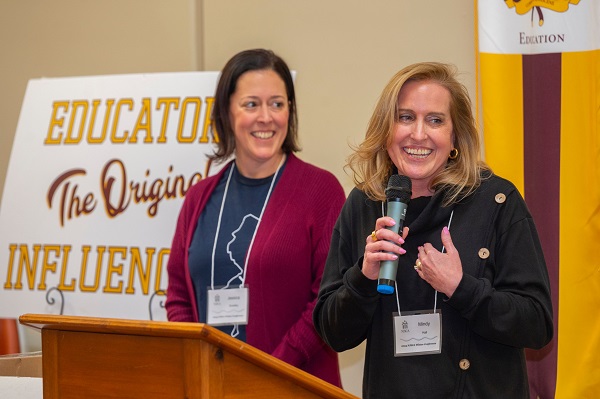NJ school counselors discuss issues, share strategies at Rowan
NJ school counselors discuss issues, share strategies at Rowan

Nearly 300 school counselors from throughout the state came together at Rowan University on Jan. 5 for the first-ever New Jersey School Counselor Association’s winter convening, hosted by the College of Education.
“We know wholeheartedly that we are the pulse of our buildings and we carry that energy with us,” Kara Ieva, professor of Wellness & Inclusive Services in Education at Rowan, said of the role school counselors play in the state’s schools. “In our roles, we are systemic change agents.”
Ieva, who led a session on social-emotional learning for school staff, noted that a recent national survey by the Substance Abuse and Mental Health Services Administration found that nearly 1 in 4 adults with access to medical care had either a substance abuse disorder or a mental illness diagnosis in 2021.
Post-pandemic, “a lot of adults and kids are living in survival mode right now. We have a growing concern that dysregulated adults are not able to regulate kids, which may affect learning,” said Ieva, who was joined in the session by Indra Owens, a school counselor in Atlantic City; Melissa Franzosi, a Rowan doctoral student and director of student personnel services at Buena High School; and Erica Figueroa, also a Rowan doctoral student and a school counselor in Gloucester Township.
Of the conference attendees, half are Rowan alumni, Ieva noted.
The role of school counselors is more multi-faceted than ever, she added. School counselors are licensed mental health professionals who have the potential to shape and create inclusive and safe school environments. But, even while addressing spikes in mental health concerns, counselors still fulfill many administrative tasks, like testing, in under resourced school systems, Ieva said.
The conference reflected that with 15 distinct sessions throughout the day exploring diverse topics in school counseling. Among them: serving families in poverty; leading college and career readiness for students with disabilities; implementing pet therapy in schools; building pathways to postsecondary success for students; and addressing issues such as human trafficking and fentanyl use.
Session presenters included school counselors, administrators, professors and graduate and doctoral students.
In her keynote address, College of Education Dean Gaëtane Jean-Marie thanked the school counselors for their work.
Even with the increase in the need for mental health services, “school counselors are being asked to do more, with fewer resources,” Jean-Marie said. “The work that school counselors do is vital for educational attainment. Thank you for what you do.”